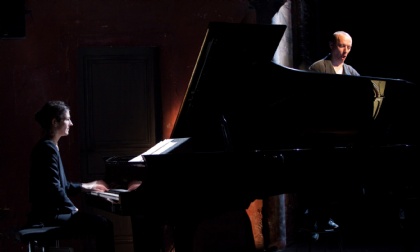|
|
 |
| Journal Archive |
| O Mensch! |
|
| Why did you choose Nietzsche’s poems as lyrics for the song cycle? What was stronger – the poetic or philosophic pathway? |
|
 |
|
| I had been wanting to do something with Nietzsche for a long time, “make my own Nietzsche,” so to speak. Apart from his early work there is, strictly speaking, no poetry in Nietzsche’s oeuvre; rather, everything he wrote becomes poetry. And thanks to the aphoristic mode of expression poetry can turn into philosophy. |
 |
| How important is it for you to set new ideas in context with history? |
|
| I am not sure I fully understand the question, but for me it is clear that Nietzsche’s ideas are always new. I would even say this is becoming ever more true... |
 |
| O Mensch! was commissioned by and premiered as a staged performance at Théâtre des Bouffes du Nord, Paris. How legitimate are audio documents of staged music for you? Don’t they miss an import aspect, the visual element? Or is the concentrated listening experience evolving an even deeper perception? |
|
It was not about staging something but about writing a scene. Or, more precisely, about writing on after the music. When I write music for the stage it often occurs that in the same train of thought images of a different scene appear before my mind’s eye. I hear a piece of music, I write it down, and I wait and see. So, images were created in my mind. With me everything originates from music, but the desire in me for a piece of music is not always created through music.
So, I see shapes, indistinct shapes, almost like a fog, blurred. The space of the voice must be almost audible, with one’s eyes half closed. In order to truly understand it one should get a little myopic. In this indistinct space listening becomes intense. It didn’t take me long to “see/understand” the walking man. We needed a man wandering about in the fog. Nietzsche is a walking man. He is alone. Always alone. He always stayed alone, walked alone. But this is not a piece about Nietzsche’s loneliness; first and foremost it is a score about Nietzsche’s passions that I want to make “understood/seen.” His mood is constantly changing, he is cheerful, sad, melancholy, hot-tempered, he’s having a good time, crying, screaming, moaning, making fun of something. Including himself. He is never the same. The performance I directed begins with an extremely low tone, coming from far away, almost from before the music. The tone creates a world. You can smell the forest, the birds, hear the murmur of water in the distance. It is nighttime. All the images and sounds in O Mensch! come from the night. The night, the actual night and also the other night, the one we invent, the night of memories. If you remember something it seems as though it came from the night. Memories, even childhood memories, always come from the night, from a night. That is why we love to remember just before we fall asleep, before we become immersed in the night. So it is like a dream, imprecise, one does not always understand what it is trying to say, but it says everything. When he sees all these images move past beneath him that is exactly what happens. I found these images with me, in my memories, and everywhere else, too. In O Mensch! there is something like a dream of blurred images that are moving past, that’s all, that’s enough. There is also an eagle. It is an eagle that is watching, but first and foremost listening. In Nietzsche’s understanding (there are plenty of animals in his oeuvre, a veritable pet shop) the eagle means unrestrained pride. It was important to show that. I wanted a lion as well, but I had to make a choice.
And then we have the light. I wanted it to be very soft, gloomy, almost impenetrable, but not all the time. The light is close to those sounds that emerge underneath the music. Like another mystery. I heard other sounds as well, not just the voice and the piano, other sounds were needed, and another scene. It took some time to shape it, I had to listen to it for a long time to find the right sound. And then there are sounds that come along just like that, it’s all very simple, and fragile; these are the true sounds of the world, the sound from before mankind. At the very back there is a statue. A very old statue, from faraway lands, a place where the people still know how to contemplate what they know about themselves, so as to never destroy it. And to preserve this memory beyond the span of their own lives they put up statues like these all around their villages, so they never forget what they learned. The statues are peaceful, they are watching the people, all the people, they are guardians, all they do is be there. Nietzsche, too, never ceases to be there.
At the end a hand strokes across a sky with fake stars, it is not the hand of God – Nietzsche is the very opposite of God – it is a hand trying to touch another space for a fleeting moment, as though one were looking at one’s inner self, and yes, it is possible to see with your hand...
That’s it, that’s how O Mensch! was created. |
|
 |
|
|
|
|
Mysterious, poetical, masterly: Listen to this lieder cycle and witness the documentation of an extraordinary encounter: Vanessa Wagner, Georg Nigl and Pascal Dusapin.  |
 |
|


